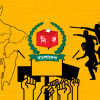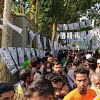What voters are thinking after the July uprising

On August 5, when news broke of the fall of Hasina's 15-years of fascist regime, BNP might have thought it had a clear path to a landslide victory in the next general election. But recent events suggest that the tables might have turned and the passage might not be so free anymore. The interim government led by Prof Yunus has made it clear that there are essential reforms that need to be carried out before a general election can be held. People seem to be largely in favour of a long-term interim government. While a general election is not in sight, assessing the current sentiment of voters can offer valuable insights into how political parties should utilise their time to prepare for the next general election. A national opinion poll can also explain how the July uprising has influenced people's voting decision.
From August 29 to September 8, Innovision Consulting conducted a public opinion poll to assess who people will vote for if a general election were held now. The findings offer invaluable insights for analysts and political parties.
Swing voters: 44-46 percent of the electorate
In our field survey (with a sample size of 5,115 individuals), 34 percent said they were undecided about who to vote for, while 10 percent respondents said they would vote for a student-led political party. In stark contrast, in the online survey (with a sample size of 3,581 individuals), 35 percent reported that they would vote for a student-led political party, while 11 percent said they were undecided. Since a student-led political party is still hypothetical, we can observe that 44 percent of field survey respondents and 46 percent of online respondents are currently undecided or "floating." In the field survey, we explored why voters were undecided. Most reported they were unfamiliar with potential candidates and did not want to simply vote based on a party symbol. It is evident that people want to know the prospective candidates in their constituency. However, it is also important to ask why online respondents are leaning towards a potential student-led political party. The answer likely lies in the differing samples between the online and field surveys.
A generational contest: Gen Z vs the rest
The online poll gathered 3,581 responses from all 64 districts of Bangladesh. Ninety-two percent of the online participants were Gen Z (born between 1997-2012) or Millennials (born between 1981-1996). And about 7 percent of responses came from Gen X (born between 1965-1980). In contrast, the field survey had 30 percent representation from Gen X, Boomers 1 (born between 1955-1964) and Boomers 2 (born between 1946-1954). This means the online survey has a comparatively younger representation, while the field survey captures a broader range of age groups.
In the online poll, 37 percent of Gen Z voters chose a student-led political party, with support decreasing among older age groups: 34 percent of Millennials and 30 percent of Gen X backed a student-led party. A similar trend emerged in the field survey, with 15 percent of Gen Z, 10 percent of Millennials, 7 percent of Gen X, 6 percent of Boomers-1, and 4 percent of Boomers-2 favouring a student-led party.
Gen Z also stands out in their opinion on the major political parties. In the online poll, 27 percent of Gen Z voters said they will vote for Jamaat-e-Islami, compared to 24 percent of Millennials and 17 percent of Gen X. In the field survey, support for Jamaat goes down significantly across all age groups, standing at 15 percent among Gen Z, 14 percent among Millennials, 13 percent among both Gen X and Boomers 1, and 12 percent among Boomers 2. One might wonder from these results whether Jamaat has a strong online presence of Gen Z supporters.
Female voters make up a silent majority
Women represent 51 percent of the country's population and can swing elections. Unfortunately, the online survey failed to generate enough responses from female voters. However, both the surveys reveal similar trends. According to both surveys, the majority of female voters are undecided or are leaning towards a student-led political party. Unlike male voters, women show low approval for Jamaat but higher approval for a student-led political party. And it goes without saying that understanding female voters will be key for political parties in the next election.
BNP leads in the field, but struggles with younger voters
In the field survey, BNP received 21 percent of the votes, while Jamaat got 14 percent. However, in the online survey, BNP got 10 percent of the votes, while Jamaat got 25 percent. BNP leads in all the divisions in the field survey but trails Jamaat in all the divisions in the online survey. BNP enjoys strong support from farmers and labourers, receiving 31 percent of votes from farmers and 21 percent from labourers in the field survey. However, support decreases among students, unemployed youth, and private-sector employees, with BNP securing only 16 percent of student votes in the field survey and 9 percent in the online poll.
In both surveys, BNP has progressively more votes from older generations, especially the Gen-X and Boomers. It is evident that the students, Gen Z, private service holders who make up the majority of those who led the July uprising do not have a positive outlook about BNP. To win the next election, BNP must gain the trust of younger generations, particularly students, unemployed youth, and private sector workers among Gen Z.
Is Jamaat gaining ground while Awami League voters remain silent?
Online analysts have speculated about the dramatic survey results, which show Awami League receiving only 10 percent of votes in the online survey and 5 percent in the field survey. They have also been surprised by Jamaat's strong performance. Some speculate that Awami League voters are currently silent, or that Jamaat supporters are more vocal in expressing their preference. Over time, these factors may have lesser impact on the results. To assess whether that is the case, we need to continuously engage with voters.
Bangladesh on the verge of political realignment?
The poll results show that Bangladesh is on the verge of a new political alignment. Younger voters are searching for a fresh political narrative, one that addresses their contemporary concerns. Mainstream parties need to win the confidence of the younger voters and women. It is clear that the people demand change. It needs to be seen whether this will manifest in the form of a new political movement or a reform of the established parties. Much will depend on how parties seize the opportunity to reconnect with disillusioned voters. While the political landscape will undoubtedly shift in the coming months, the road to political dominance in Bangladesh, it seems, is no longer straightforward.
Md Rubaiyath Sarwar is managing director, Innovision Consulting.
Views expressed in this article are the author's own.
Follow The Daily Star Opinion on Facebook for the latest opinions, commentaries and analyses by experts and professionals. To contribute your article or letter to The Daily Star Opinion, see our guidelines for submission.

 For all latest news, follow The Daily Star's Google News channel.
For all latest news, follow The Daily Star's Google News channel. 











Comments